LeBron James's dominance proves maddening for Warriors in NBA Finals

In the NBA, a superstar is measured by his presence. It cannot be tabulated in a box score—only outlined vaguely by scoring and rebounding totals, sketched out slightly by shooting percentages and raw plus-minus. It shapes a game even when a player seems not to be involved in the immediate action. The far side of the court is not beyond influence; the best players still dictate matchups, draw attention, and register doubt in their opponents’ minds. In the moment, that presence manifests as the unambiguous threat to take over any possession at any time.
LeBron James projects such terror almost casually. Games 5 and 6 of these NBA Finals were populated with all kinds of noise—cross-talk, suspensions, foul trouble, flare-ups—but effectively shaped by James. It was his jumper that busted the cushion of the Warriors’ defense, forcing Andre Iguodala to defend him more closely or surrender efficient attempts. With that shift, he pushed the Warriors back on their heels and found the means to get into the lane. From that came access to Cleveland’s game. The trouble of playing Golden State is that their switching defense can be difficult to break down and force into rotation. James has successfully compromised it in two straight games against every possible combination of Warriors.
• LeBron turns in historic performance | Warriors unravel in Game 6
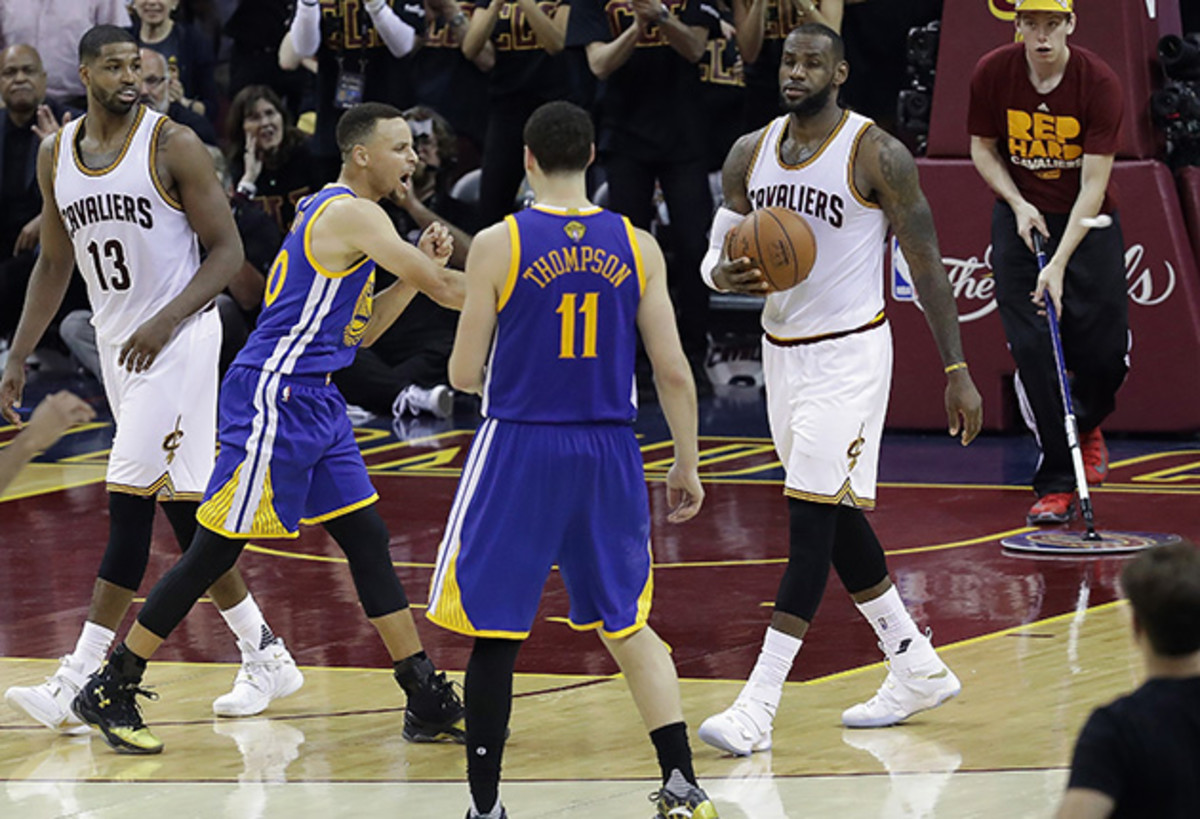
Earlier in this series, James was productive but flummoxed. Iguodala is the most proficient on-ball defender against LeBron in the league and Draymond Green an ideal, roving helper. Between them, Golden State was able to apply pressure on the ball while shrinking the floor to eat into the most predictable passing lanes. James turned the ball over 19 times between Games 2, 3, and 4—unusual disorder from one of the most cerebral players in the league.
James then assumed complete control through the next two games of the series. When Golden State played a traditional center, he strung out pick-and-rolls and attacked the space of the recovery:
[youtube=https://youtu.be/YSt8sJ692kw]
When the Warriors went small, James forced uncomfortable switches that brought an overloading defender to his side of the floor, if only to punish them with the pass:
[youtube=https://youtu.be/6ke1zvv0hlM]
Putting more bodies between James and the rim sprung leaks elsewhere, but covering him one-on-one set up some overmatched defender for the fall. Clout at that level engenders a certain hopelessness in an opponent. When James can not only score and set up his teammates with ease but go about both by manipulating the defense however he wishes, a team like the Warriors is left at the whim of a basketball genius.
• Curry fined $25k for mouthpiece toss | Barnes not a max player
Greatest Game 7s in NBA History
2016 NBA Finals
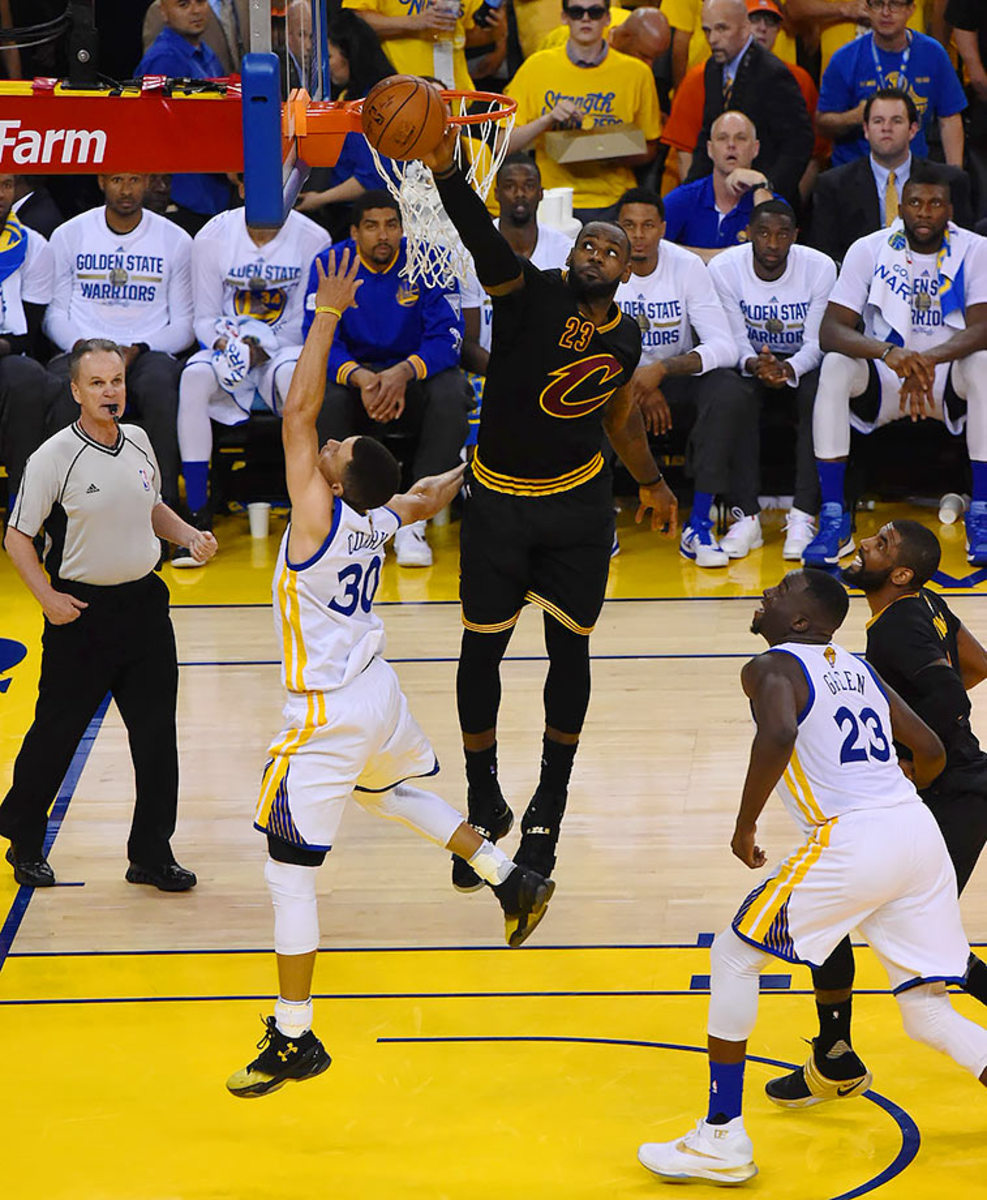
In a testy series of blowouts — and a few blowups — the winner-take-all Game 7 provided the thrilling finale with LeBron James as the finals MVP disarming two-time reigning MVP Stephen Curry and his record-setting Warriors. Playing his sixth straight finals, James almost single-handedly carried Cleveland back into this series and finished with 27 points, 11 assists and 11 rebounds as the Cavs defeated the Warriors 93-89 to capture their first championship in franchise history and gave their city its first major sports winner since the Browns won the NFL title in 1964. He also had three blocked shots and two steals, overcoming five turnovers.
2016 Western Conference Finals
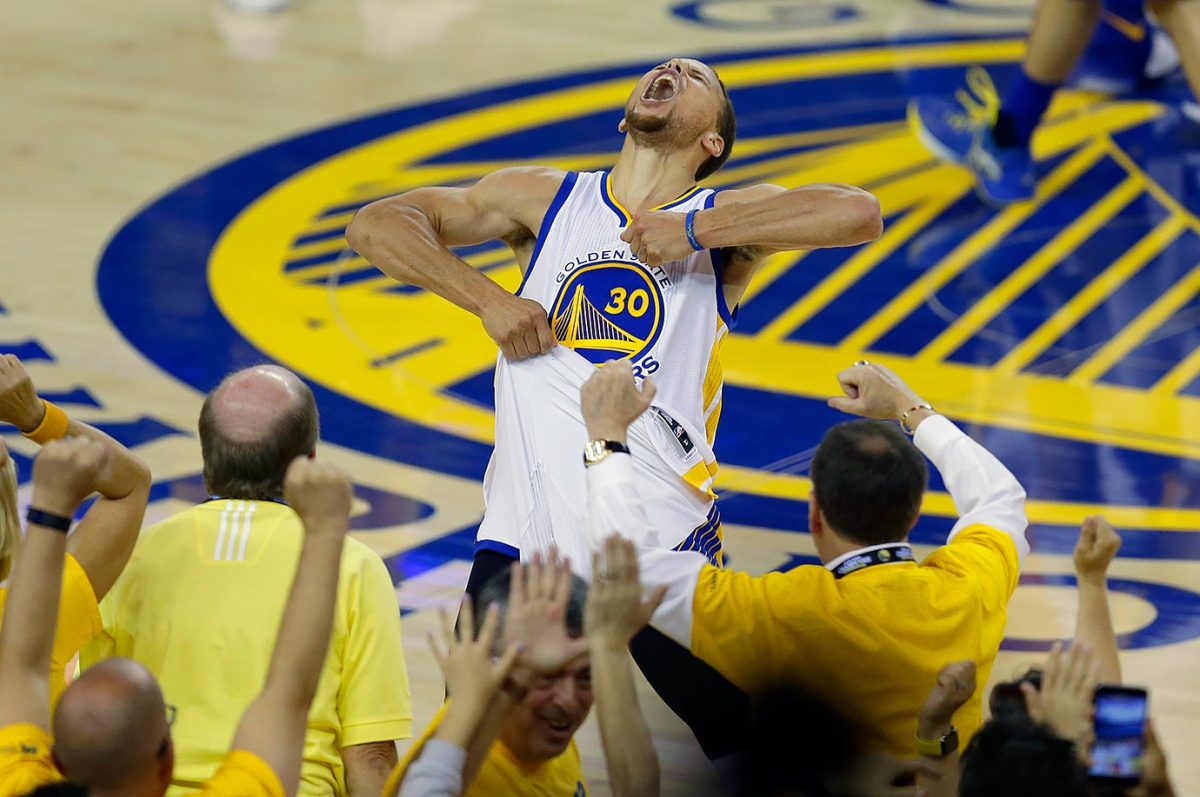
The Warriors, who fell behind 35-22 in Game 7 against the Thunder, became the 10th team to rally from a 3-1 deficit and win a postseason series after beating Oklahoma City 96-88. League MVP Stephen Curry scored 36 points with seven 3-pointers to finish with an NBA-record 32 in a seven-game series, and also had eight assists.
2015 Western Conference First Round
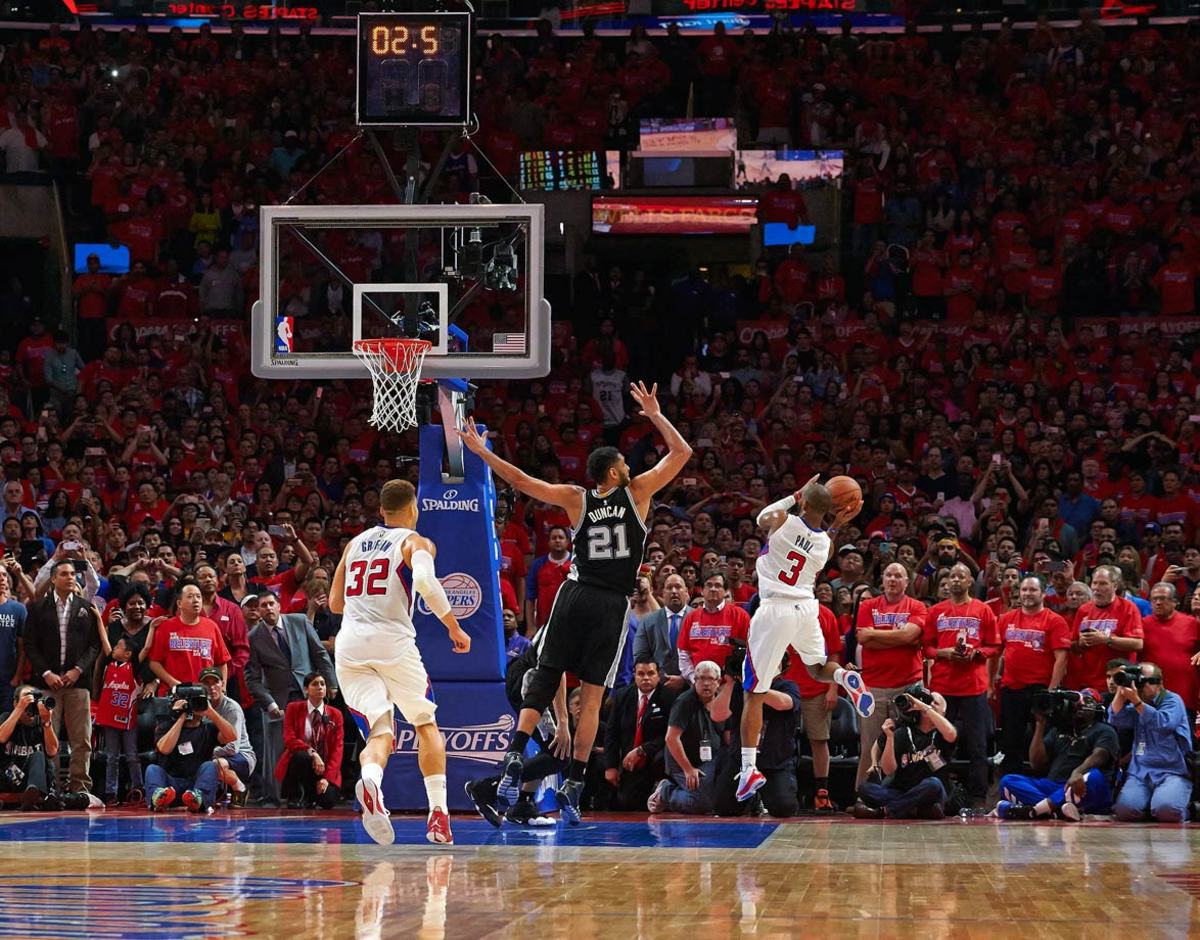
Clippers point guard Chris Paul delivered a driving bank shot over 6' 11" Tim Duncan to KO the defending champion Spurs 111-109 in Game 7 of their first-round playoff series. The teams traded the lead 31 time, and neither held an advantage of more than three points over the final 5:26. Paul, who strained his left hamstring in the first quarter and missed more than seven minutes to receive treatment, hobbled to a team-high 27 points—the last two on this improbable heave off his injured leg with one second left.
2013 NBA Finals
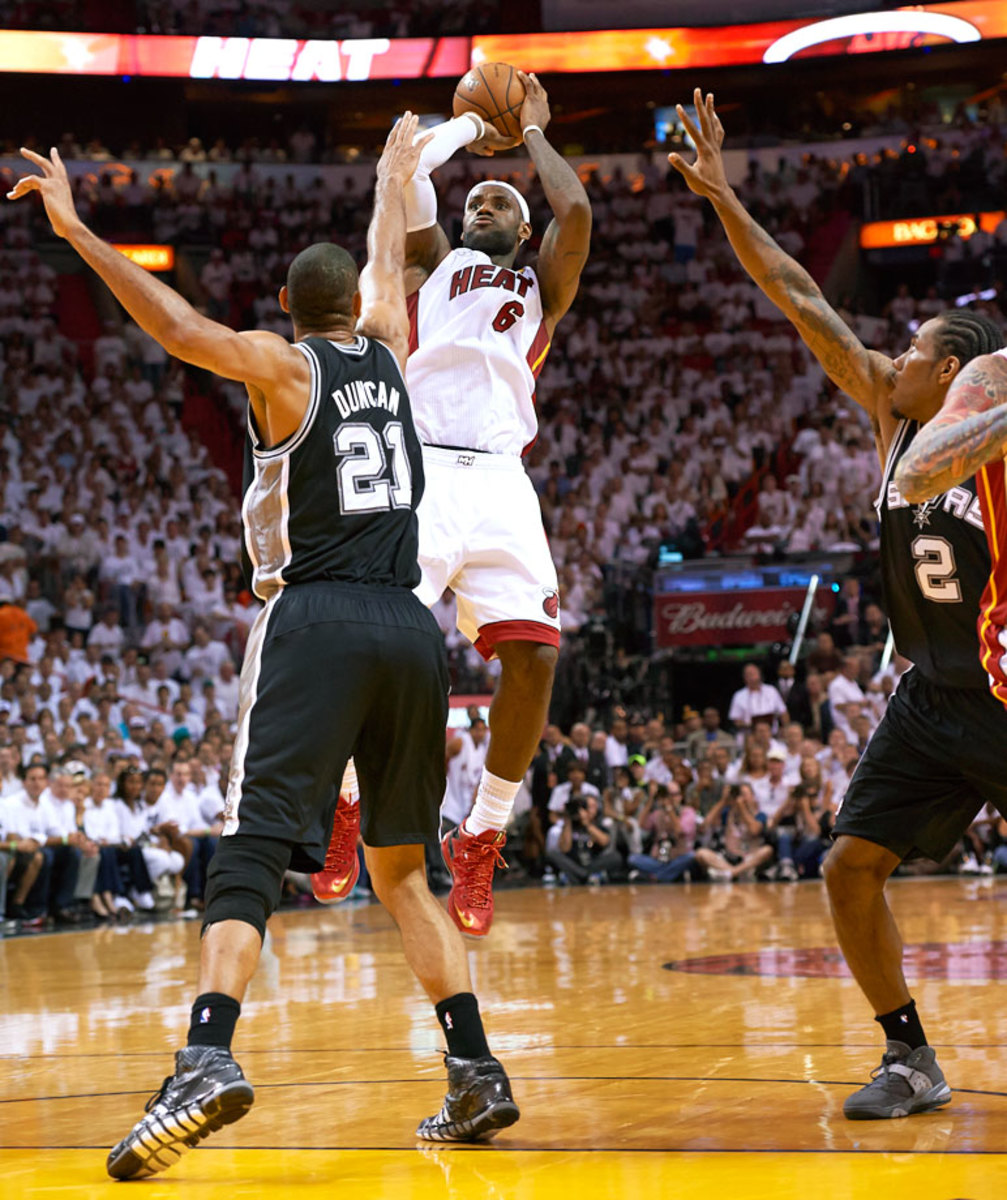
LeBron James scored 37 points, grabbed 12 rebounds and simply controlled everything down the stretch to win his second consecutive NBA title and second Finals MVP award. James made five three-pointers, defended Tony Parker when he had to, and did everything else that could be expected from the best player in the game in the Heat's 95-88 victory over the Spurs.
2010 NBA Finals
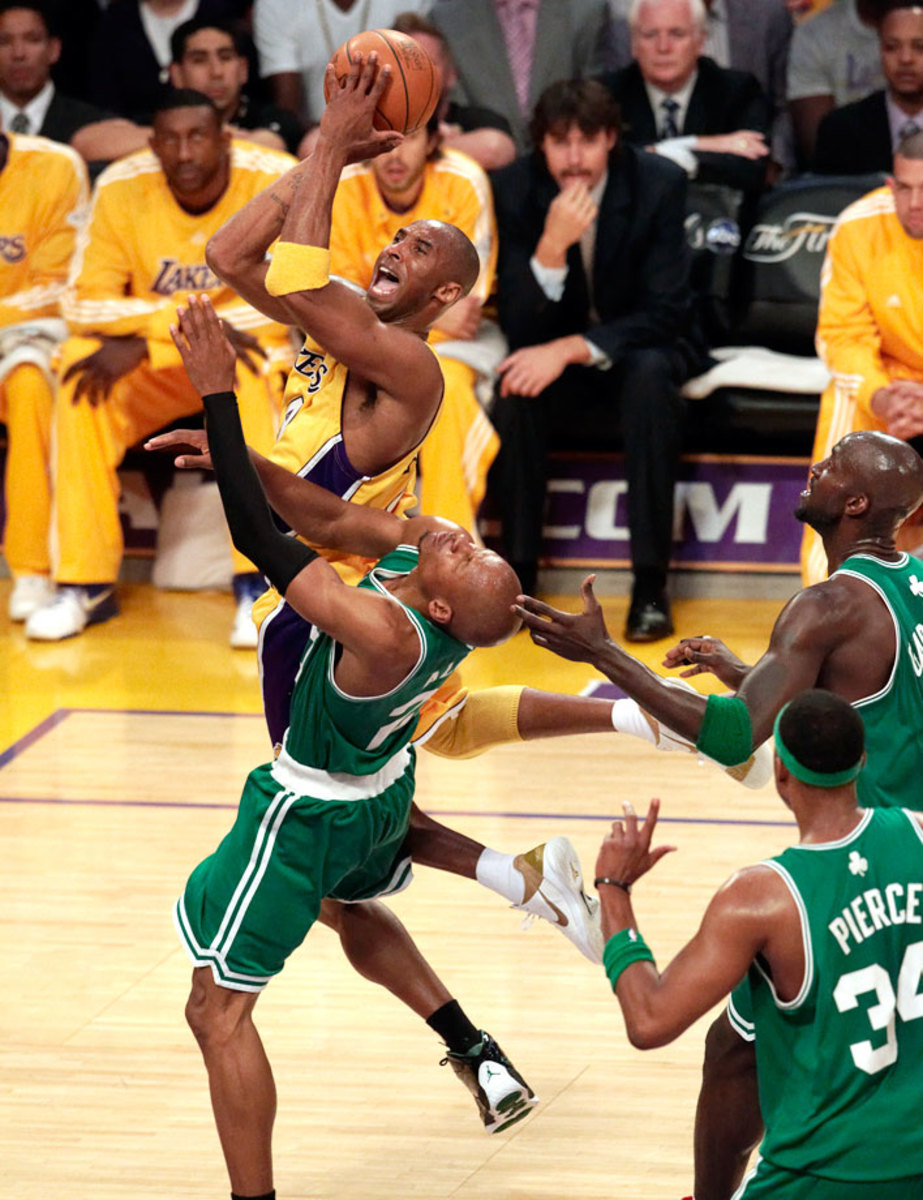
Injuries, fatigue and a poor night of shooting didn't stop Kobe Bryant from acquiring a second consecutive NBA championship and his fifth overall. Despite his unsightly 6-for-24 shooting, Bryant (23 points, 15 rebounds) led the Lakers to a gritty 83-79 Game 7 win over their storied rivals. The basketball certainly wasn't the best from either team -- the Lakers' shot 32.5 percent from the field and missed 12 free throws, while the Celtics committed 15 turnovers and were outrebounded, 53-40 -- but L.A. rallied from a 13-point second-half deficit for the title win. The Celtics entered the series having never lost a Game 7 in the Finals but left as just the seventh team in history to blow a 3-2 Finals lead after winning Game 5.
2008 Eastern Conference Semifinals
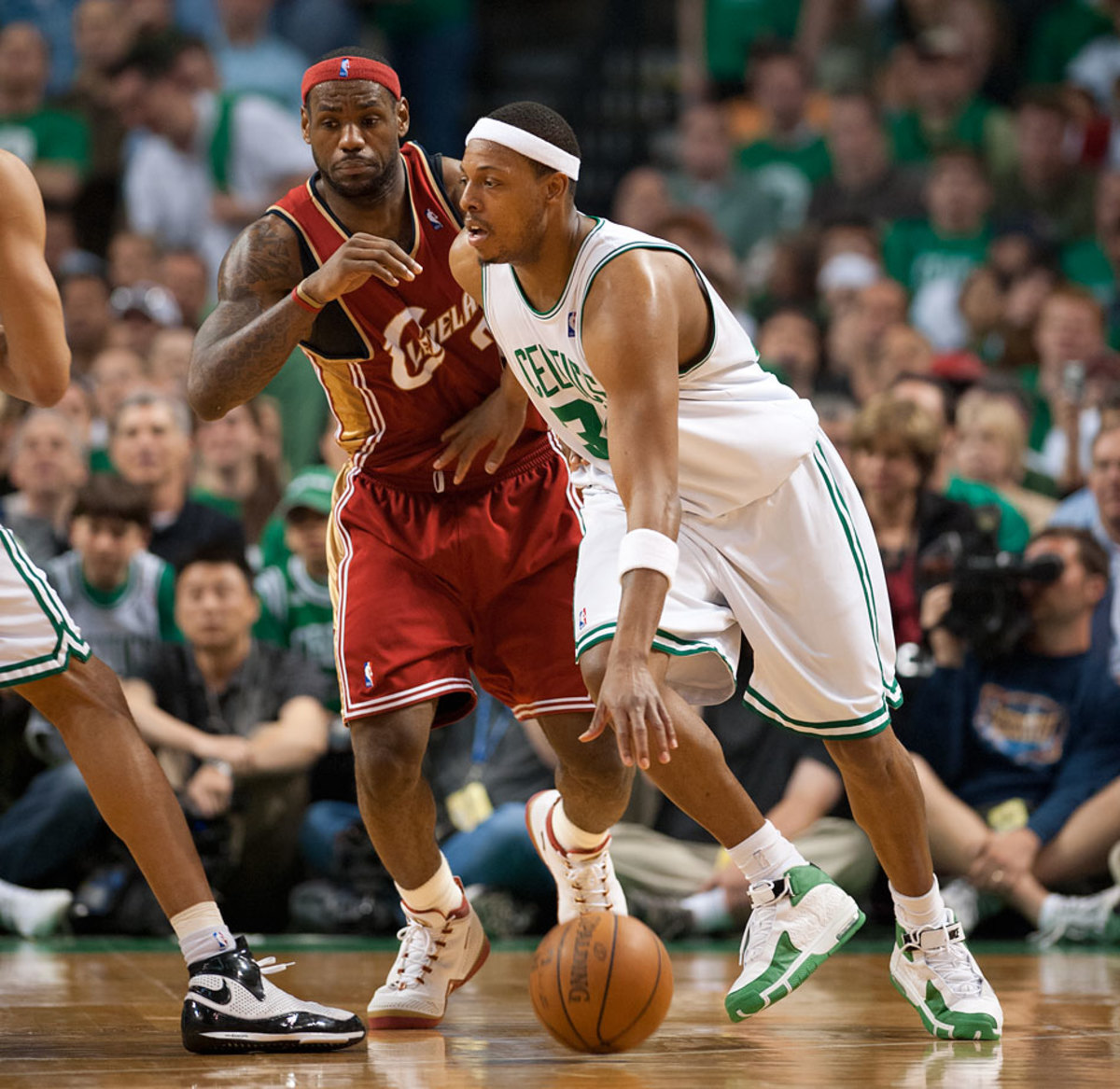
Paul Pierce (41 points) and LeBron James (45) went back and forth in a duel reminiscent of Larry Bird vs. Dominique Wilkins in Game 7 of the conference semifinals 20 years earlier. Pierce's Celtics prevailed 97-92 to wrap up a series in which the home team won every game. The Celtics went on to win the championship, while the loss spurred Cleveland to give LeBron more offensive help by acquiring Mo Williams in the offseason.
2002 Western Conference Finals
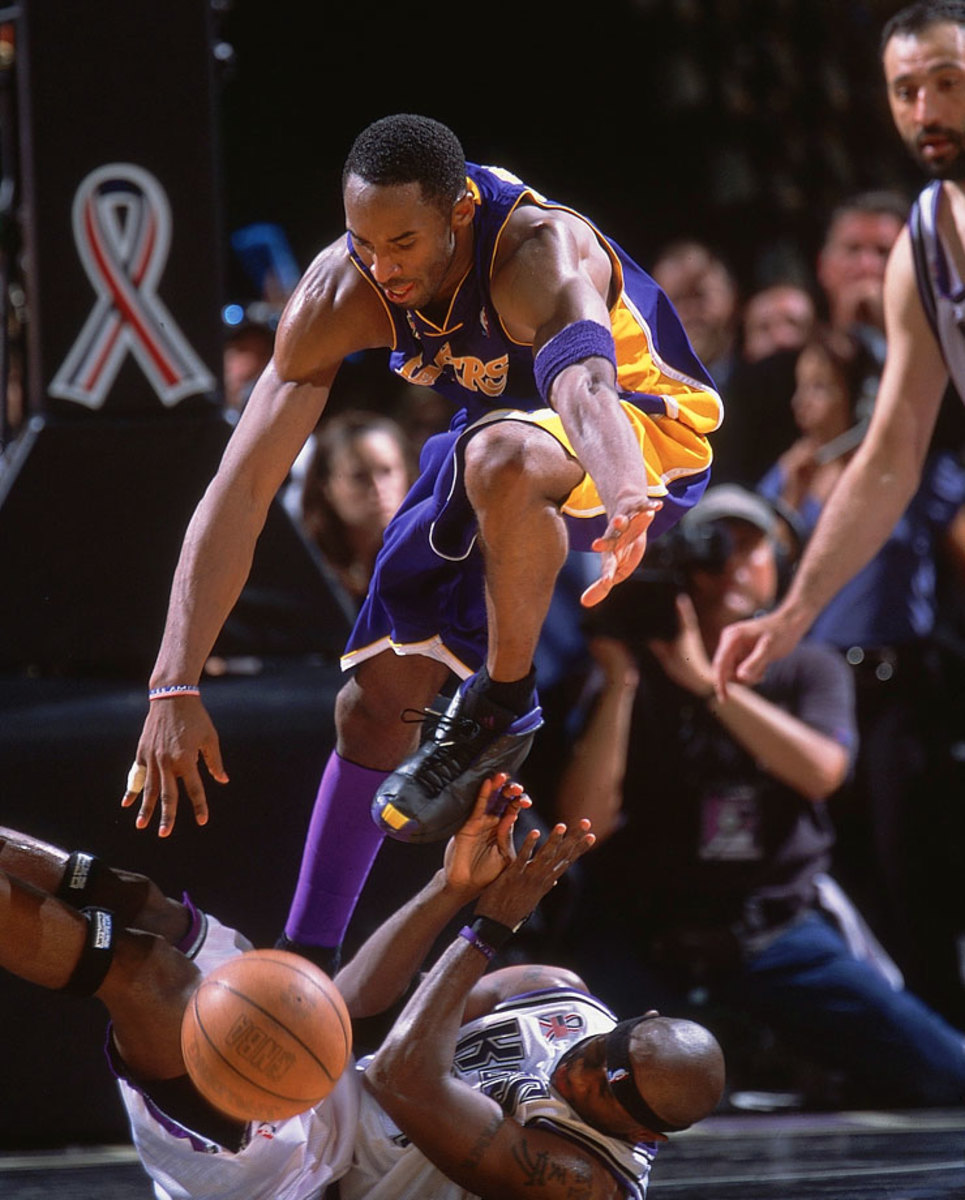
The Lakers joined the 1976 Suns (at Golden State) as the only road teams to win a Game 7 in the West finals. Kobe Bryant finished with 30 points in 52 minutes. The Kings missed 14 of 30 free throws and came up small in crunch time with the exception of Mike Bibby, who scored 14 of their last 18 points.
2000 Western Conference Finals
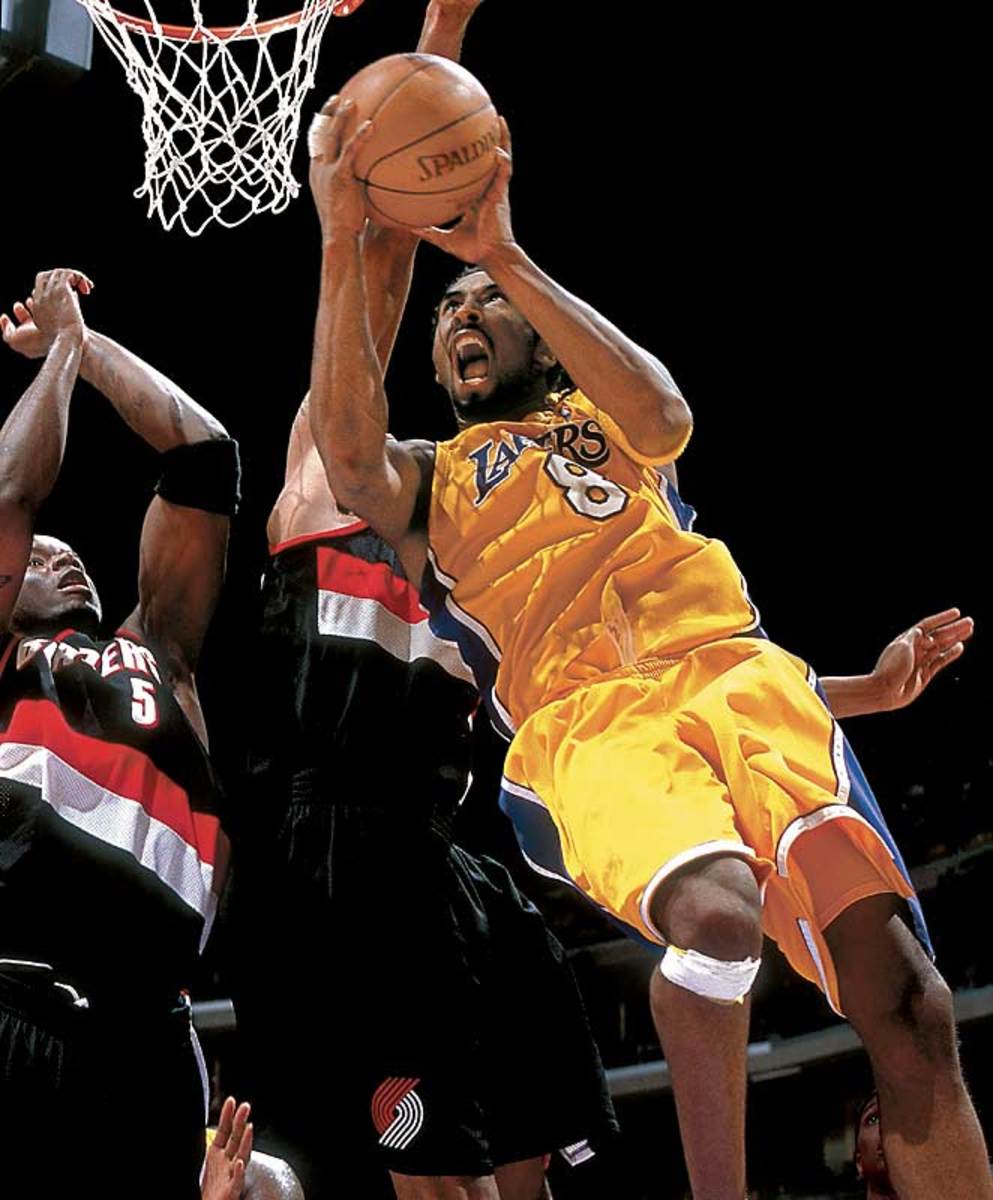
Shaquille O'Neal and Kobe Bryant led the Lakers back from a 15-point fourth-quarter deficit to topple the Blazers 89-84 in Los Angeles en route to their first NBA crown under coach Phil Jackson. "We realize we sort of made cowards of ourselves in the fourth quarter," Portland's Scottie Pippen said after the game.
1998 Eastern Conference Finals
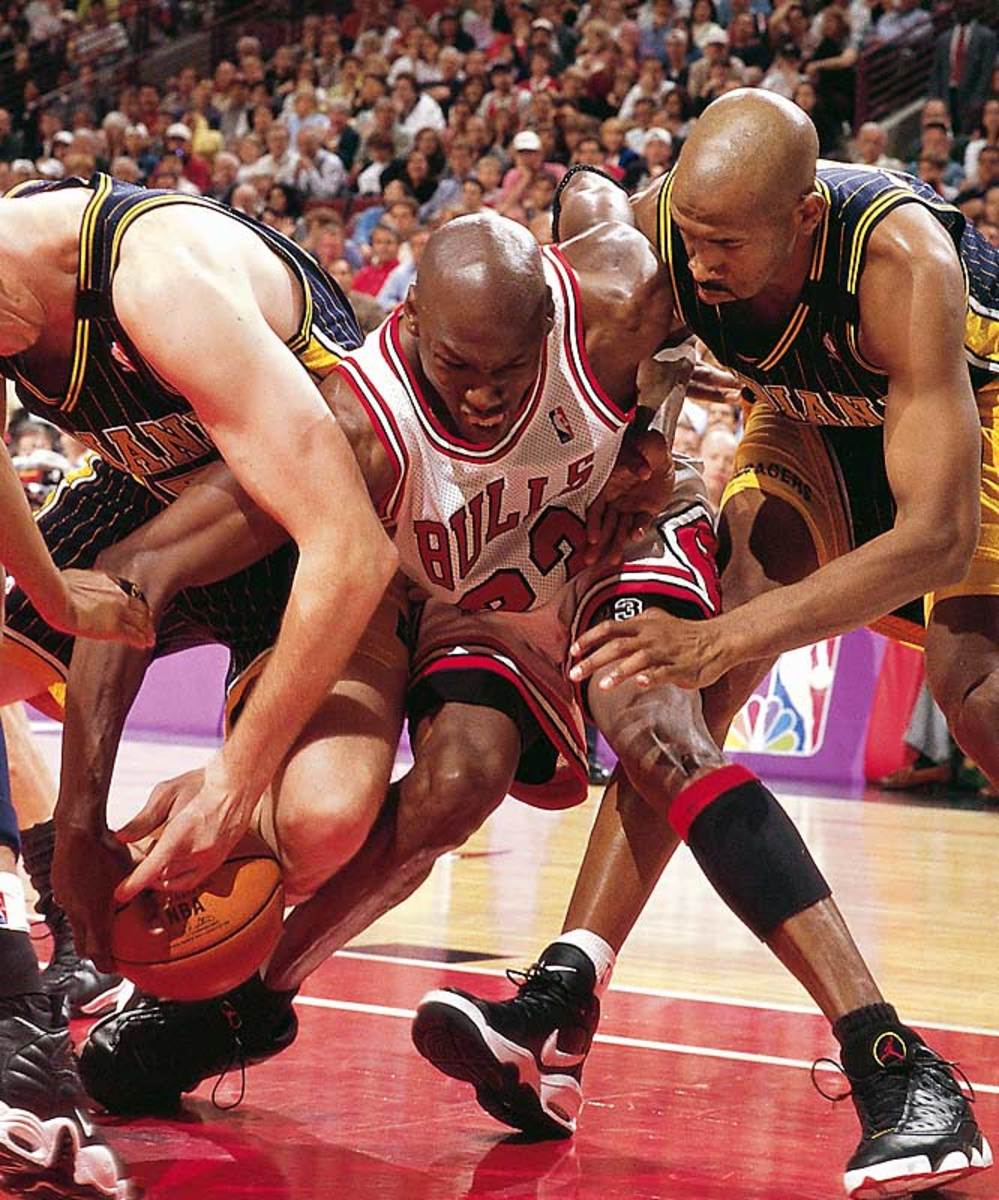
Trailing in the fourth quarter of their first Game 7 in six years, the Bulls overcame Indiana 88-83 behind Michael Jordan's 28 points. The Bulls went on to beat the Jazz in the NBA Finals to complete their second three-peat.
1995 Western Conference Semifinals
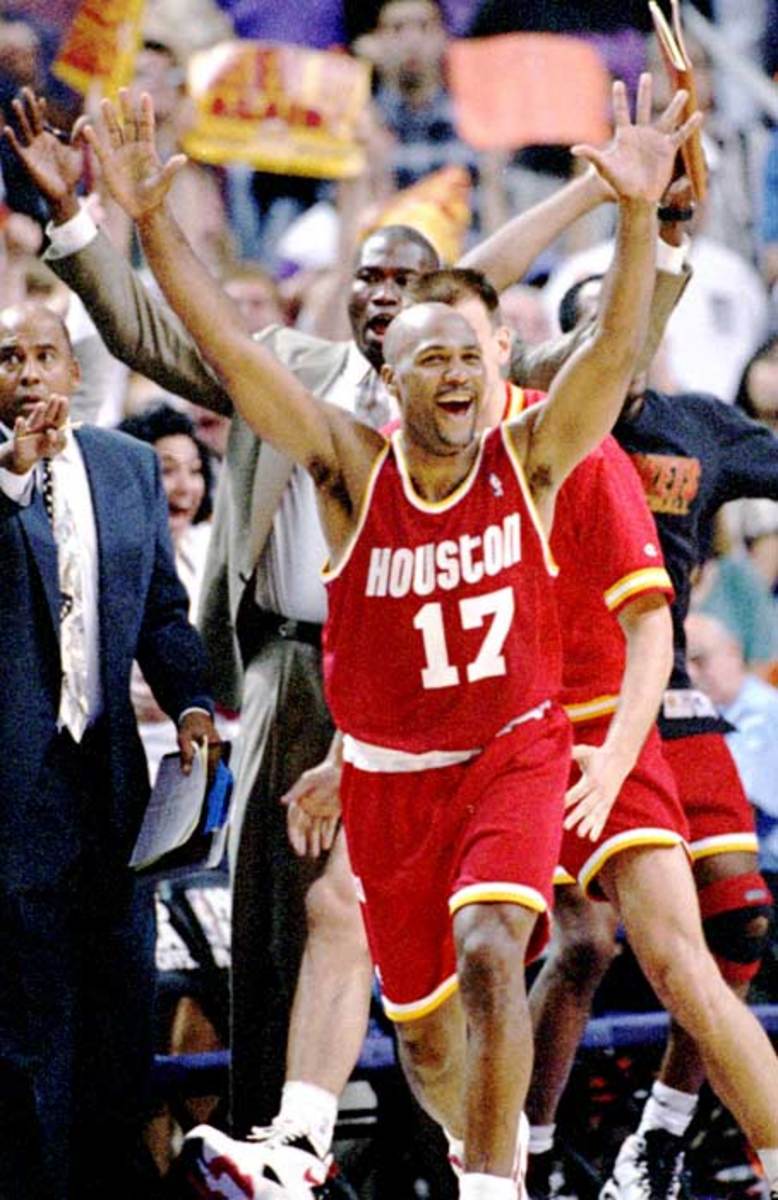
Guard Mario Elie nailed a go-ahead three-pointer from the corner with 7.1 seconds left as the Rockets won 115-114 at Phoenix, completing their comeback from a 3-1 series deficit en route to claiming a second straight NBA title. Kevin Johnson scored 46 points for the Suns.
1990 Western Conference Semifinals
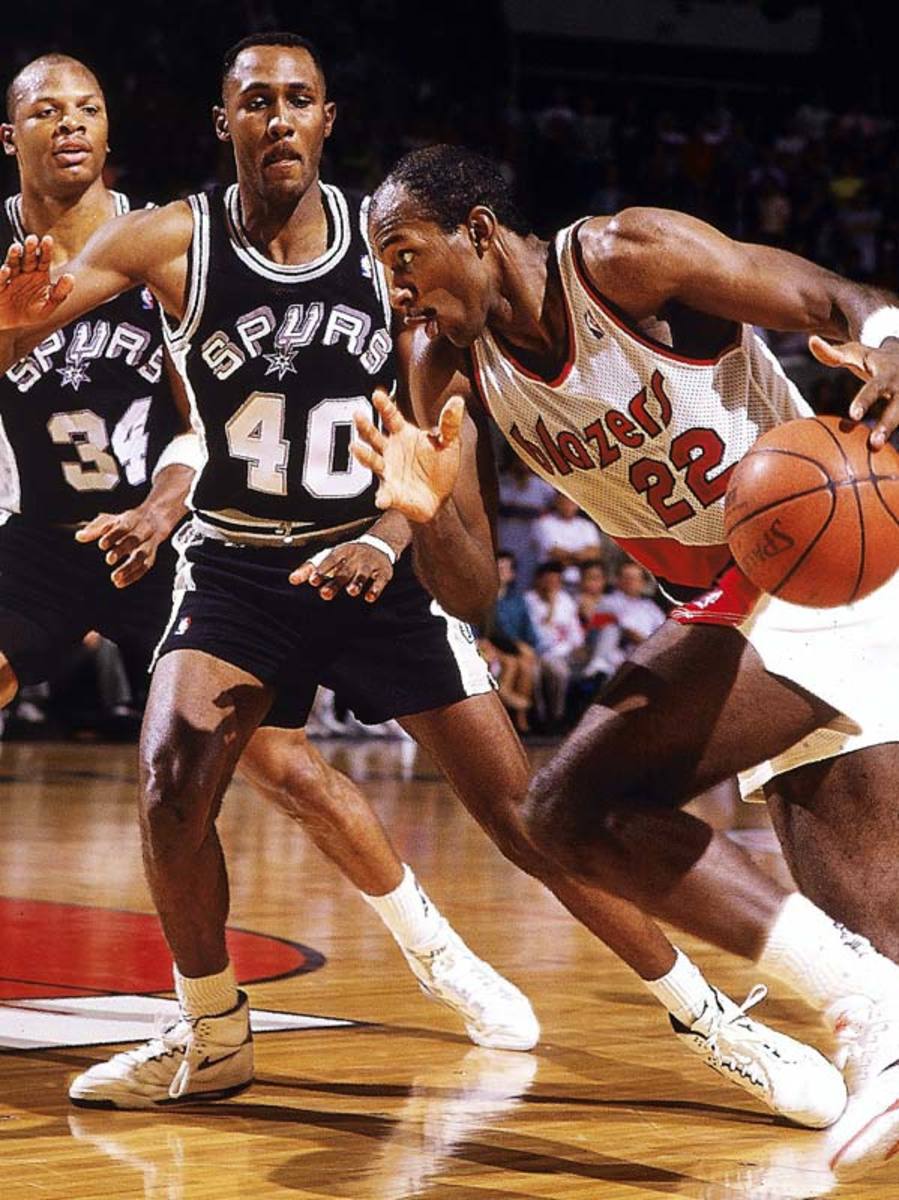
While Blazers center Kevin Duckworth provided an emotional lift by playing for the first time in the series after missing the previous six games with a broken hand, it was Clyde Drexler's five free throws in the final 26.2 seconds of overtime that clinched Portland's 108-105 win. The Spurs had the ball with the game tied 103-103 and about 30 seconds left, but Rod Strickland threw a no-look pass to no one in particular, and then he committed a breakaway foul on Drexler that led to two free throws and possession for Portland.
1988 NBA Finals
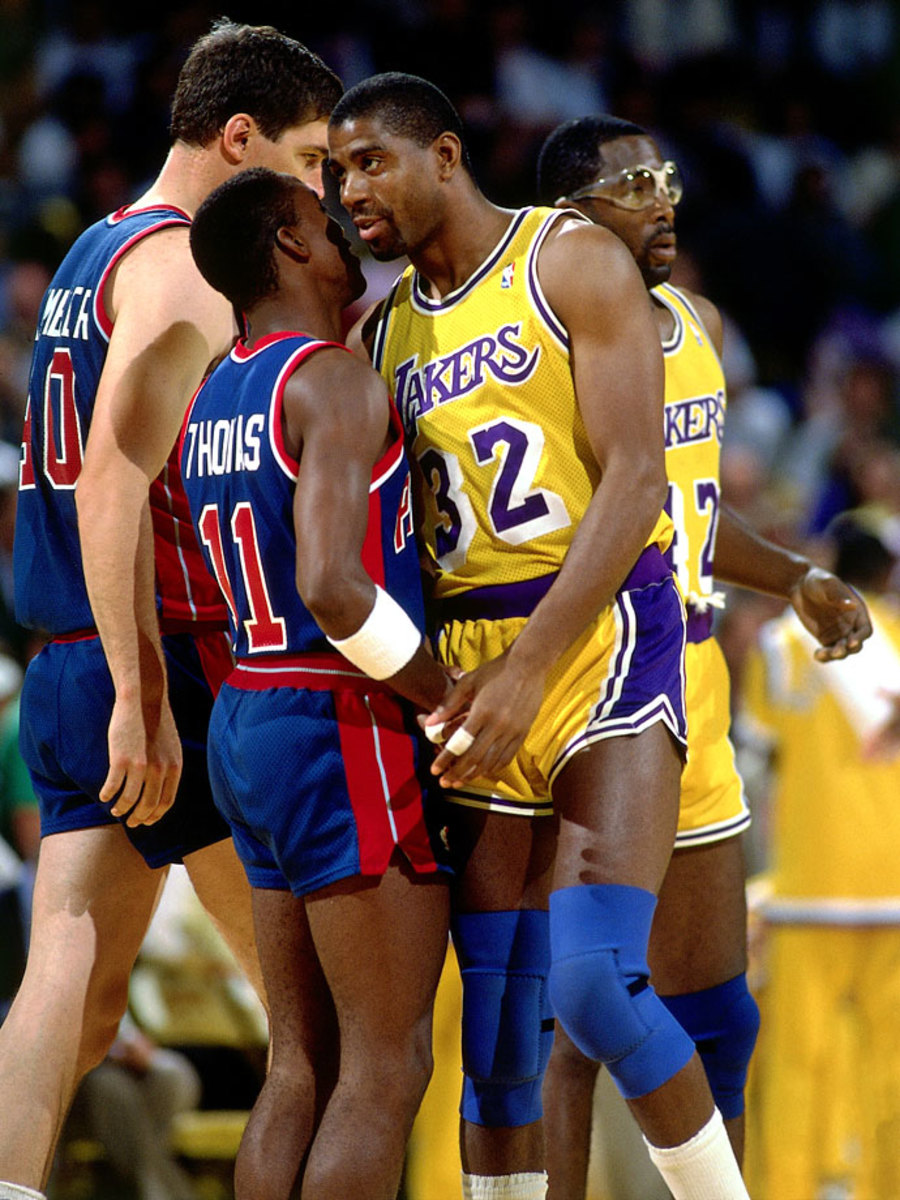
Facing an upstart Detroit team in their third Game 7 of the playoffs, the Lakers defended their NBA championship with a 108-105 victory in Los Angeles. Finals MVP James Worthy led the way with 36 points and 16 rebounds, while the Pistons were weakened by Isiah Thomas' lingering ankle injury.
1988 Eastern Conference Semifinals
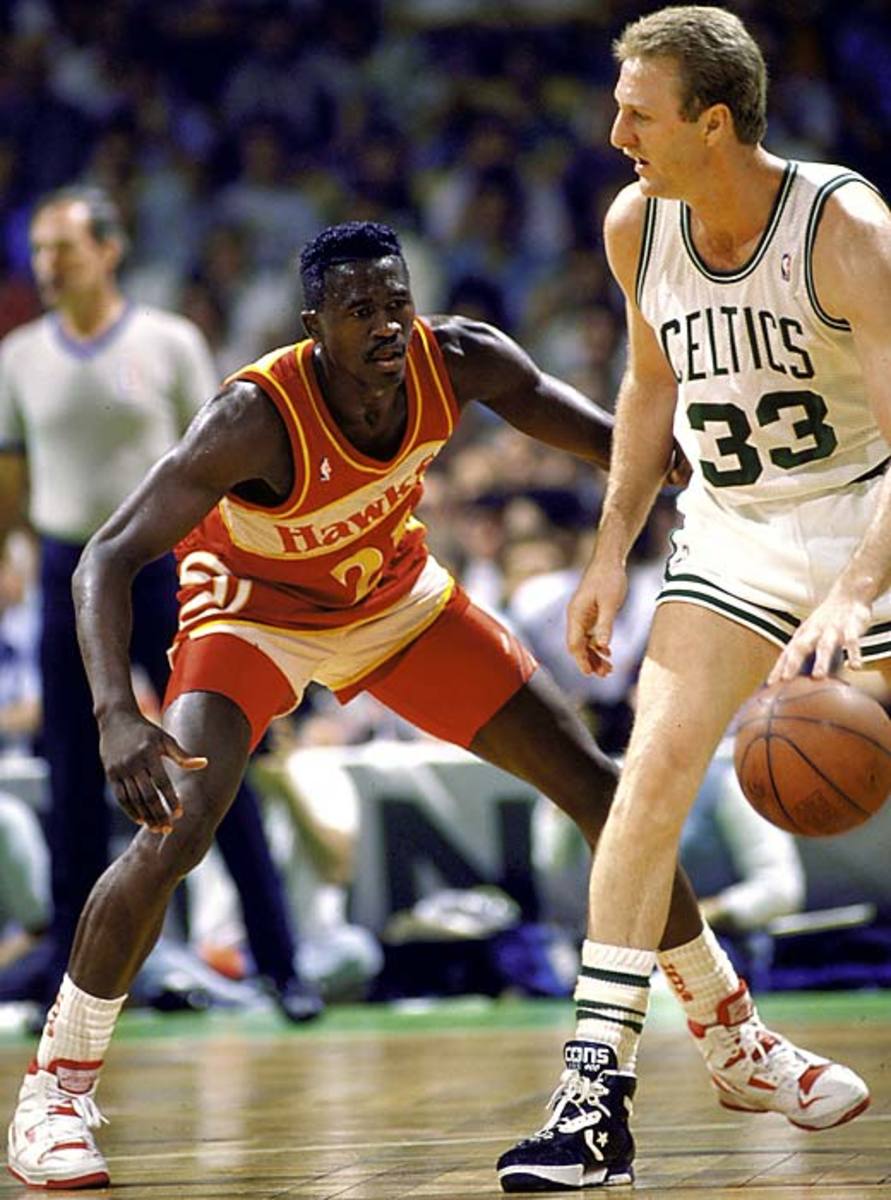
Dominique Wilkins, Atlanta's Human Highlight Film, exploded for 47 points in a stirring showdown with Larry Bird. But Bird saved his best for last, scoring 20 of his 34 points in the fourth quarter to help the Celtics escape 118-116.
1987 Eastern Conference Semifinals
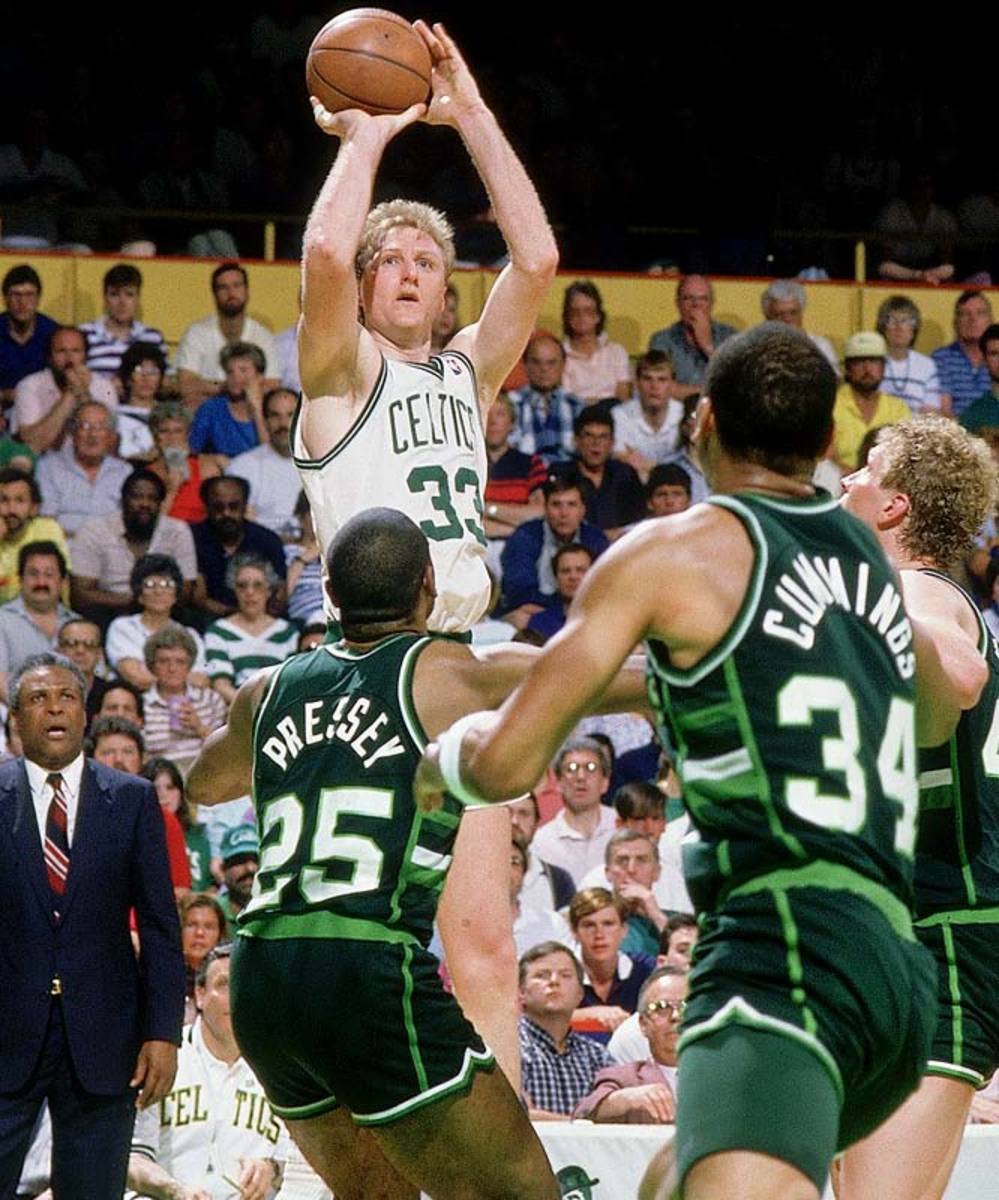
The defending champion Celtics took a 3-1 series lead over Milwaukee before coach Don Nelson's Bucks stormed back to knot the series. The Bucks even led for most of Game 7, but their late cold spell, combined with Larry Bird's 13 fourth-quarter points, gave the Celtics a 119-113 victory.
1986 Eastern Conference Semifinals
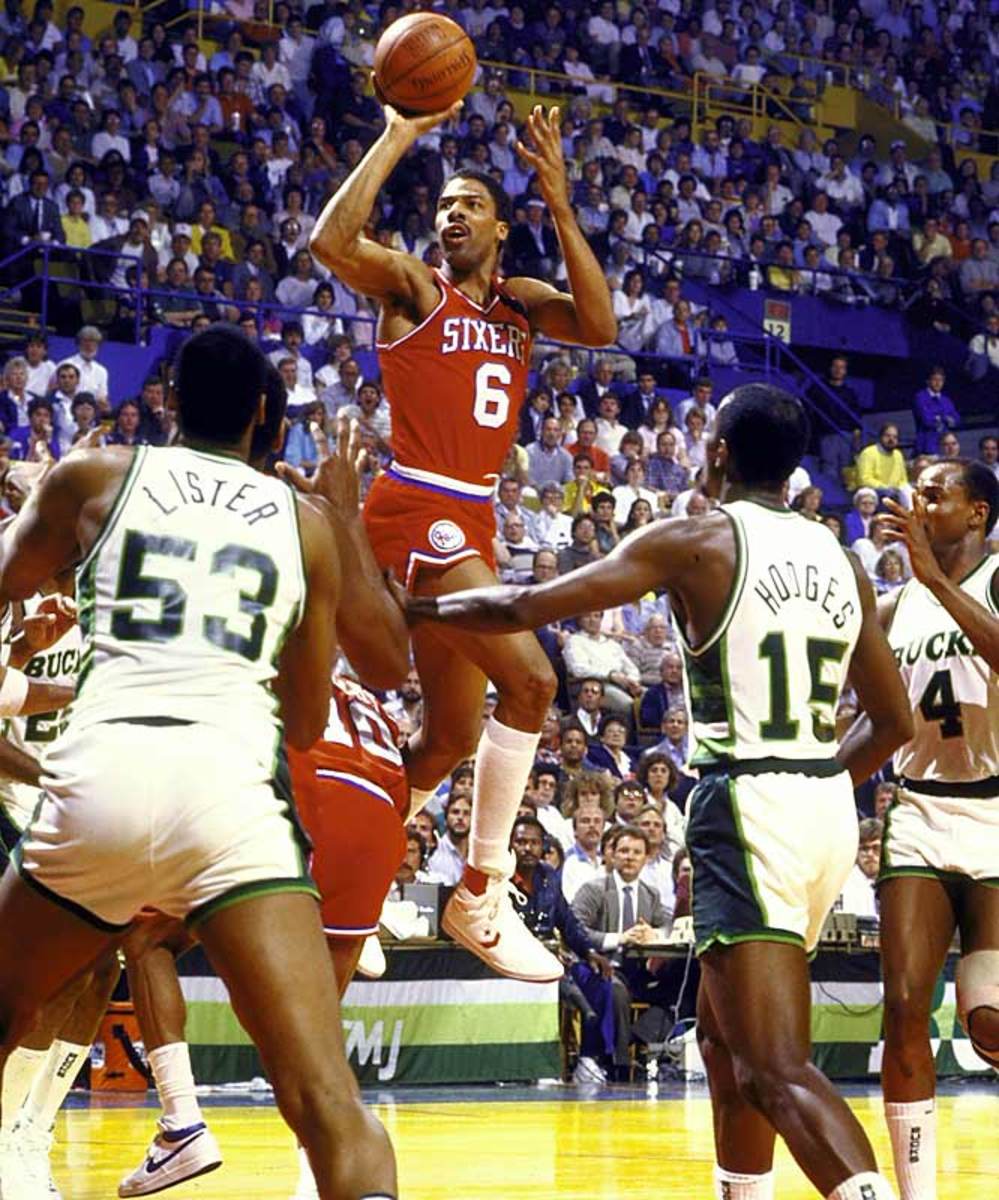
Milwaukee gained a measure of revenge after losing to Philadelphia in the playoffs in four of the previous five seasons. This time the Sidney Moncrief- and Terry Cummings-led Bucks survived 113-112 after Julius Erving missed an open 15-footer with two seconds left.
1984 NBA Finals
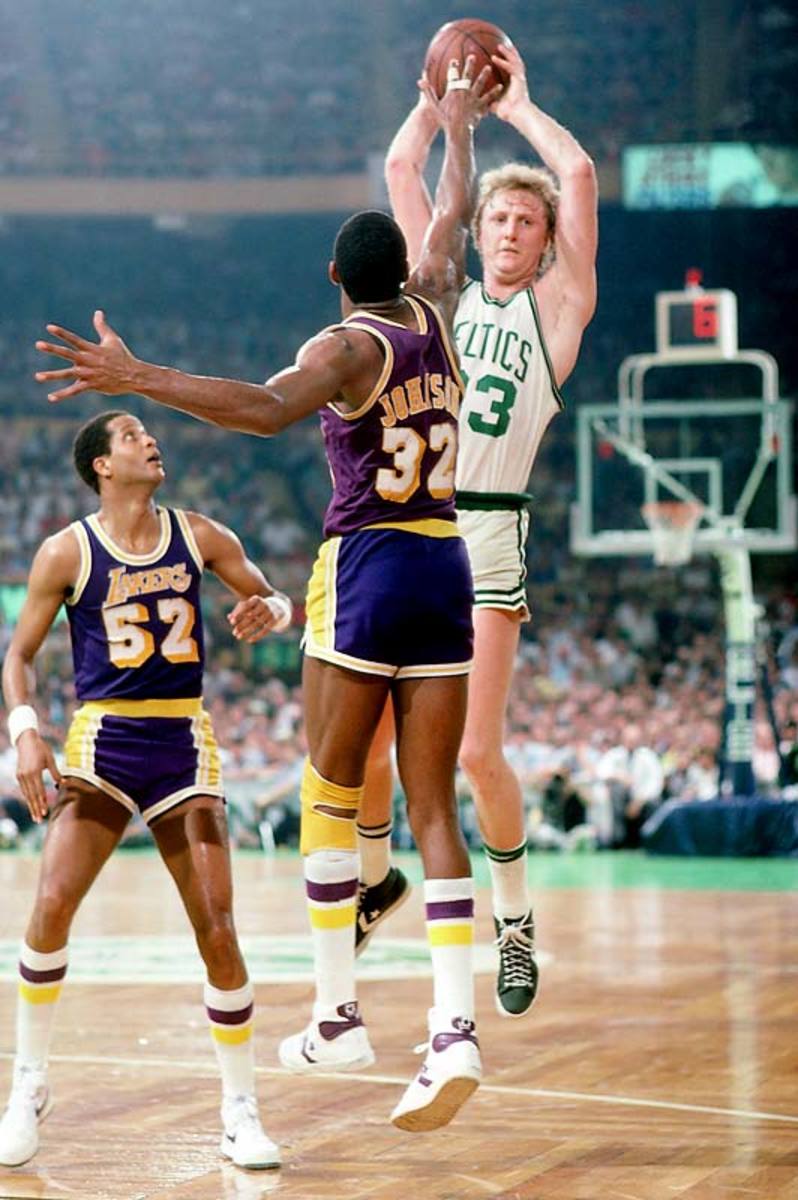
In the first Finals duel between Magic Johnson and Larry Bird (pictured earlier in the series), the Celtics survived the Lakers' late comeback to win the decisive game 111-102. Cedric Maxwell scored 24 points for Boston and Finals MVP Bird added 20 points and 12 rebounds.
1981 Eastern Conference Finals
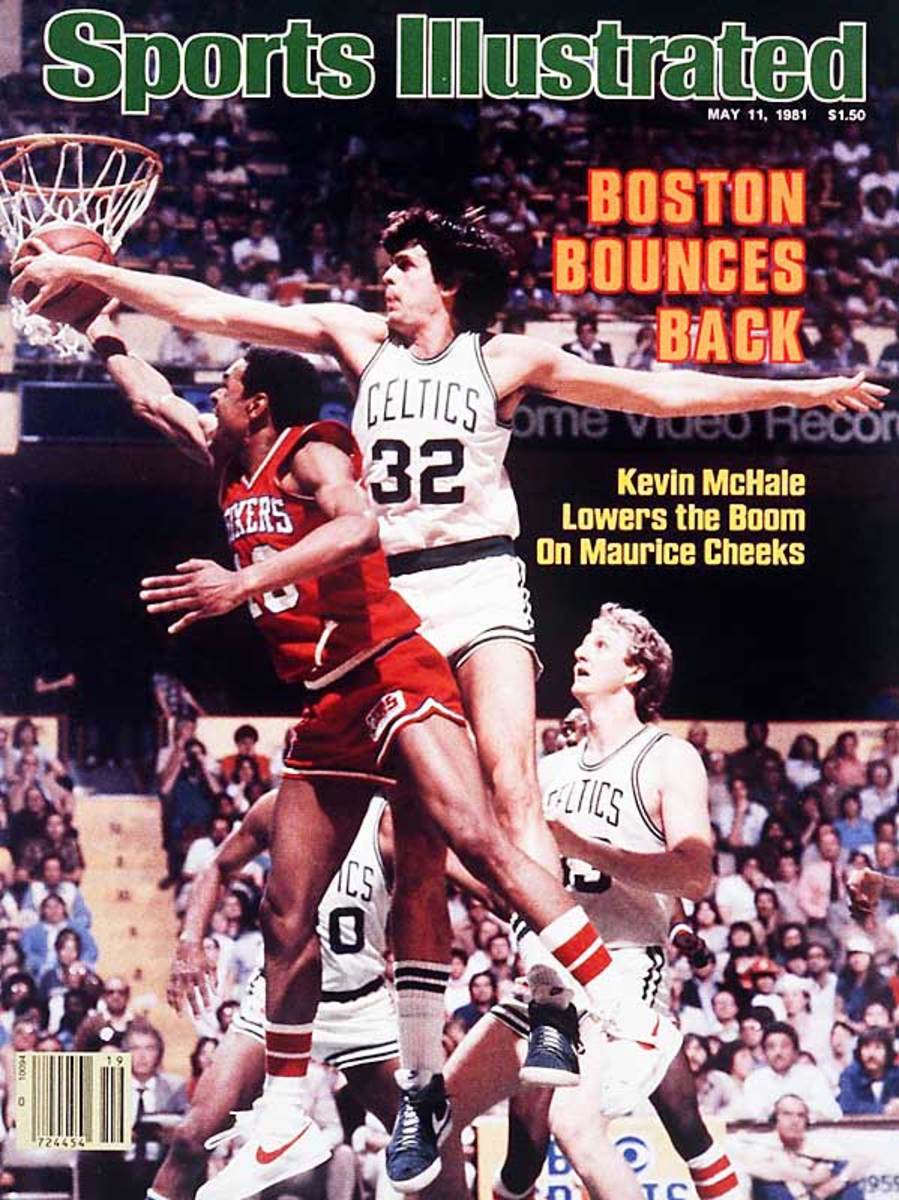
A tight series between two 62-win teams fittingly went down to the wire. Larry Bird hit a go-ahead bank shot in the final minute as the Celtics rallied from a six-point deficit in the final 4:30 to beat Philadelphia 91-90.
1970 NBA Finals
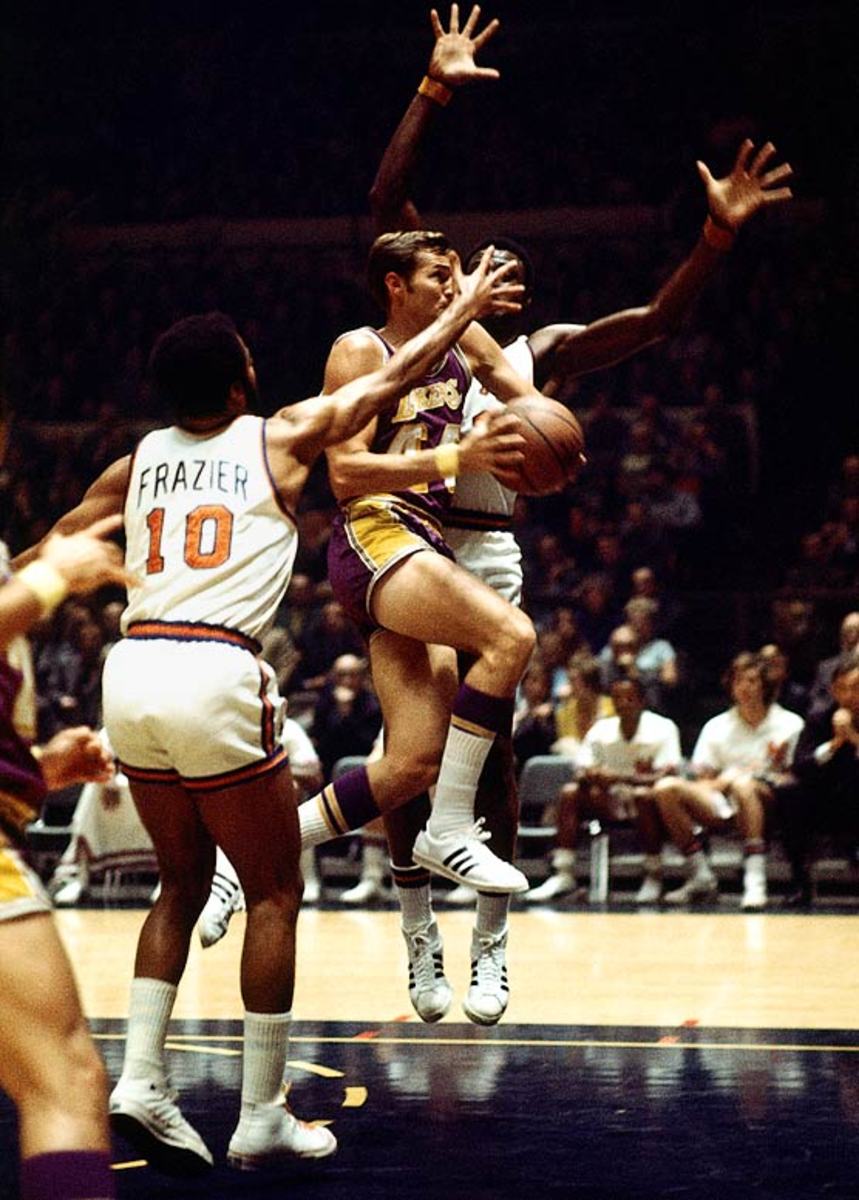
After hobbling off the court early in Game 5 with a torn thigh muscle, Willis Reed made a surprising and triumphant return moments before tip-off for the deciding game. Buoyed by his presence — and his scoring the first two baskets of the game — the Knicks won the title 113-99 behind Walt Frazier's 36 points and 19 assists.
1969 NBA Finals
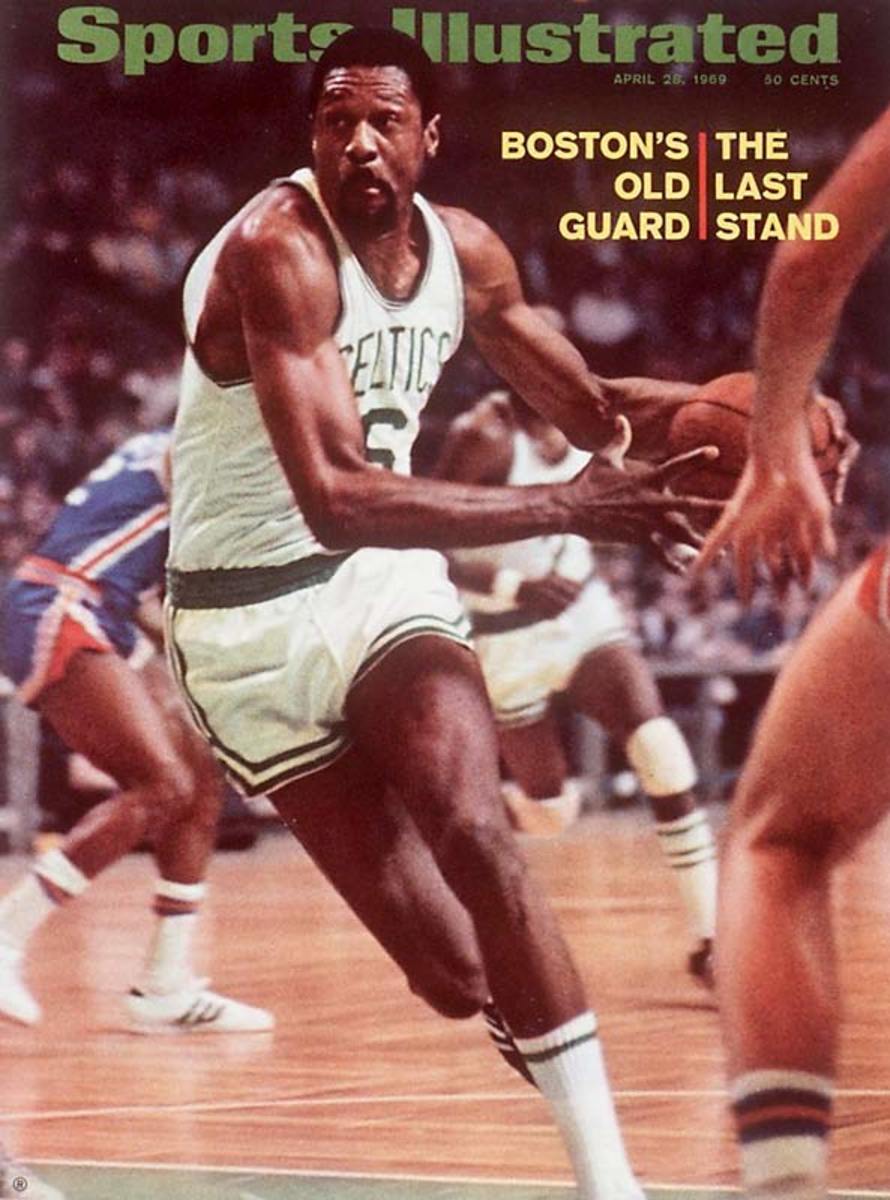
The Celtics nearly squandered a 17-point fourth-quarter lead but, thanks in part to Don Nelson's famous last-minute shot near the free-throw line, held on to win 108-106. Bill Russell, the NBA's greatest winner, retired as a player after collecting his 11th title.
1965 Eastern Division Finals
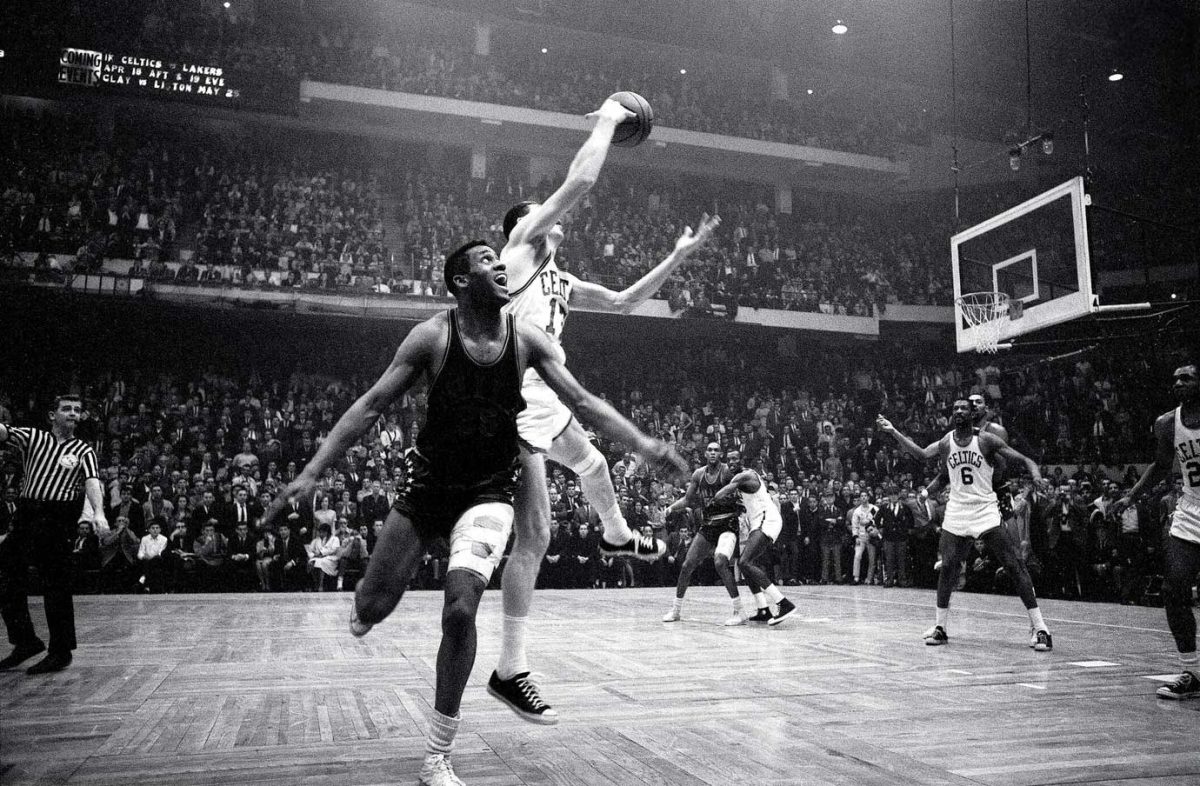
After Red Auerbach had lit his traditional victory cigar with his Celtics leading 110-103, the 76ers closed the gap to 110-109 and had possession with seconds left. But as Hal Greer tried to inbound to Chet Walker, Boston's John Havlicek stole the pass, leading longtime Celtics play-by-play man Johnny Most to famously cry, "Havlicek stole the ball! Havlicek stole the ball!"
1962 NBA Finals
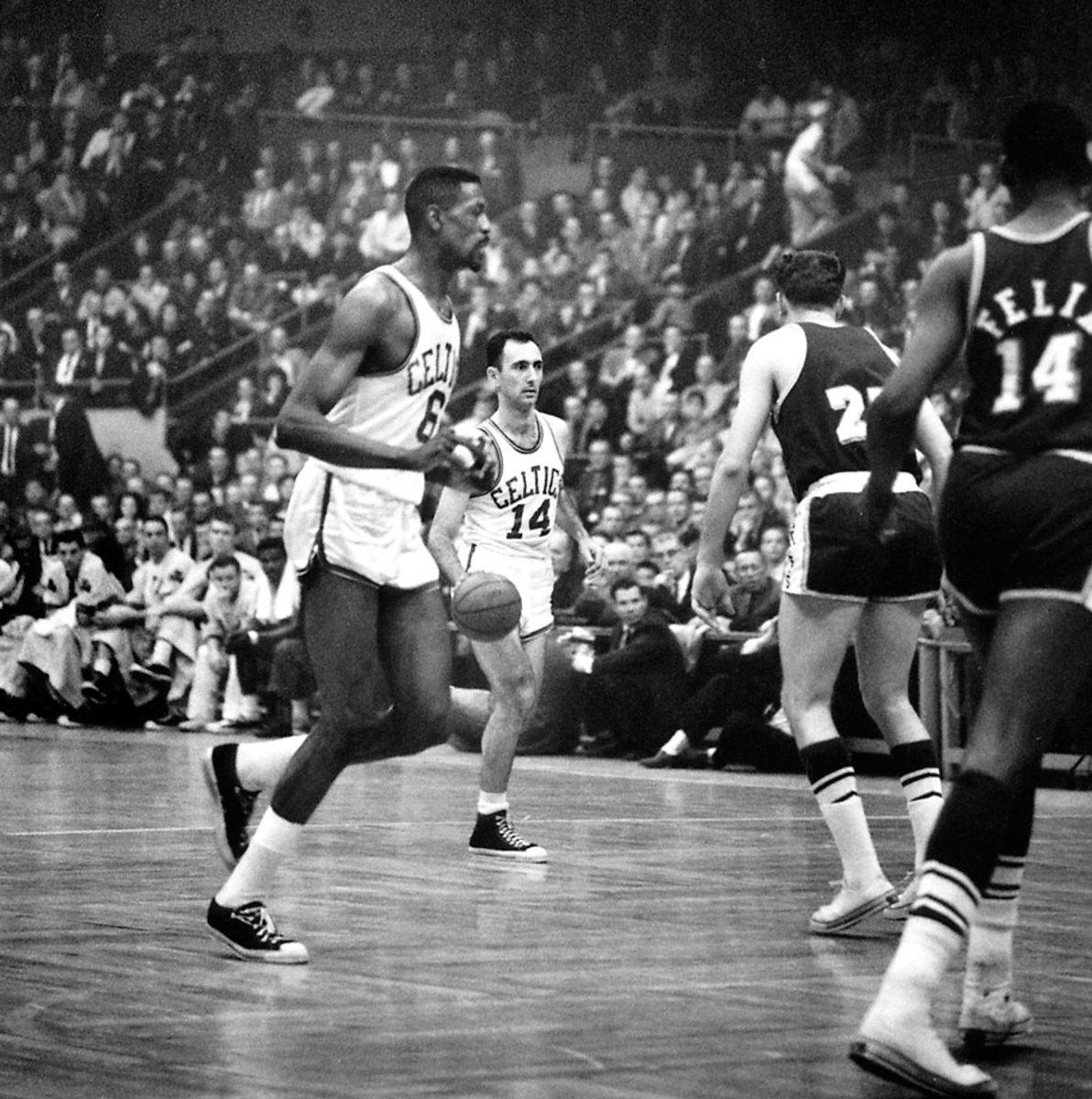
In the midst of winning eight consecutive championships, the Celtics escaped 110-107 in overtime. The Lakers had an opportunity to win it in regulation, but Frank Selvy missed a mid-range shot in the closing seconds.
1957 NBA Finals
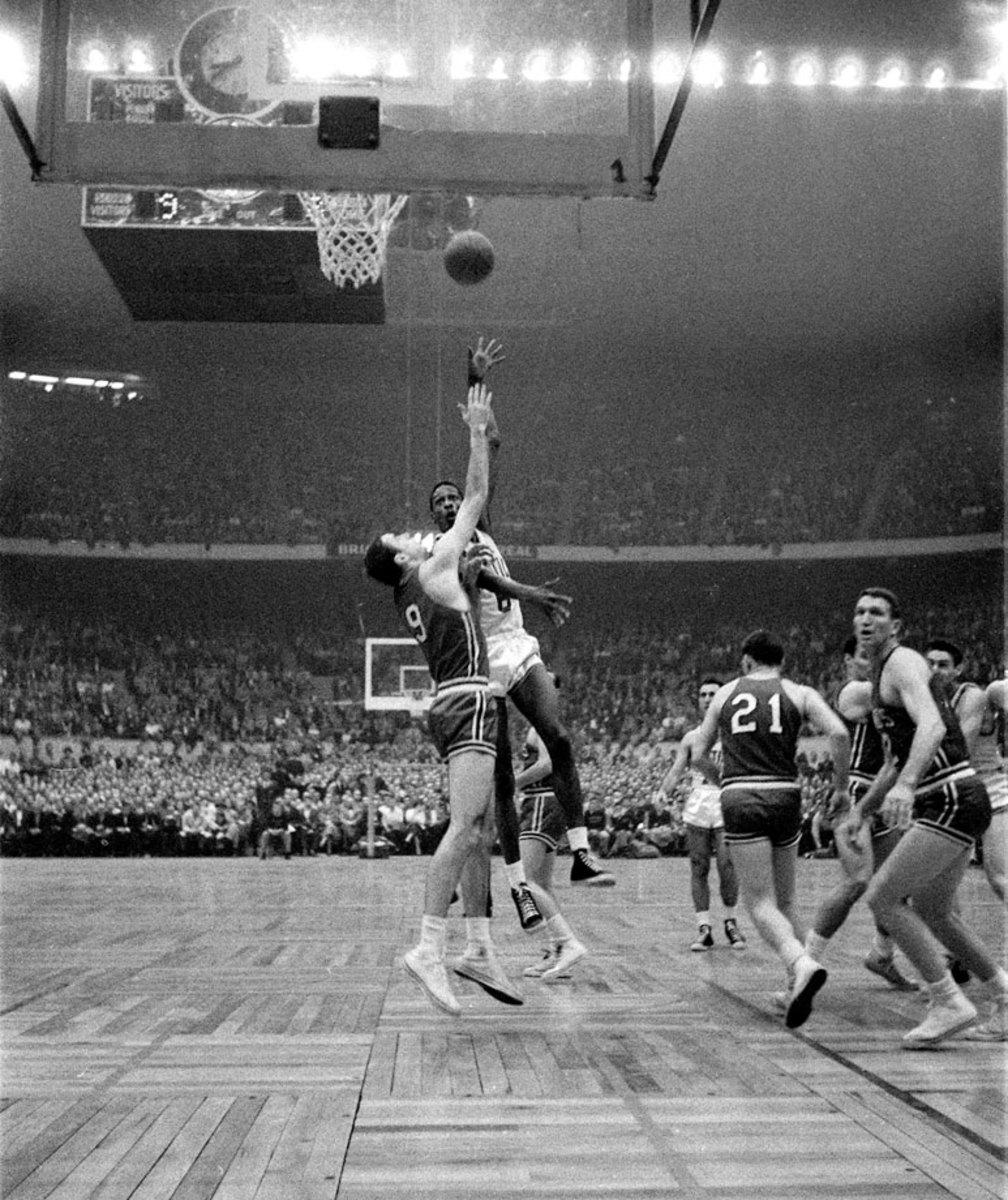
A rookie center named Bill Russell finished with 19 points and 32 rebounds, and fellow rookie Tom Heinsohn had 37 points and 23 rebounds as the Celtics overcame a combined 5-for-40 shooting performance from Bob Cousy and Bill Sharman to prevail 125-123 in double overtime. It was Boston's first NBA championship.
And so it wasn’t enough for James to drop 41 points in the second straight game—he manufactured five of Tristan Thompson’s six field goals, assisted on 12 of J.R. Smith’s 14 points, and turned Mo Williams and Dahntay Jones (who hadn’t seen a minute of meaningful play in the Finals) into spot scorers. James made himself available and refused to be ignored, darting into the lane from 25 feet out for cuts and offensive rebounds to salvage stalled plays. No Warrior seemed able to shake James on defense, either; both Green and Stephen Curry pump faked James desperately only to have their shots blocked, while Klay Thompson hesitated and passed out of crowds when James was near. Fast breaks were rebuffed by James alone. In time, every possession became a LeBron possession.
Cleveland’s season was saved through that dominion. A team as good as Golden State could not be toppled twice in a row without help, though in so many ways James makes his own. A skilled marksman like Smith can make good on a pass rocketed right into his shooting pocket. The energy that Thompson expends every trip down the floor is validated by a playmaker who regards him as a primary target. Even the way that James runs, cuts, and defends sparks a panic that all Cavaliers can feed off of.
It is a testament to LeBron that Golden State, a team of remarkable basketball intelligence, has been prompted to do so many dumb things over the last two games. Great players inspire a senselessness in their opponents stemming from their unshakable frustrations. It is maddening to know that James is not only bigger, stronger, and faster than the man guarding him, but also several moves ahead. The Finals turned on that exasperation, and through it James and the Cavs might see a dream realized.
